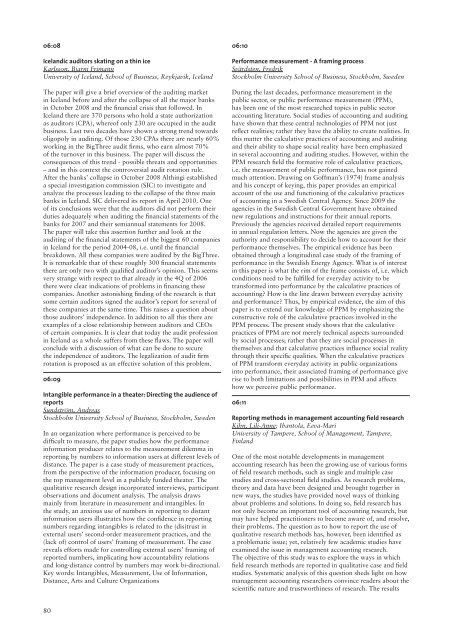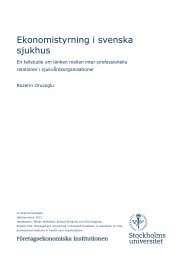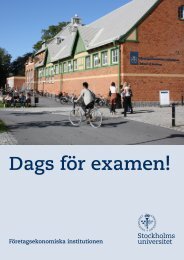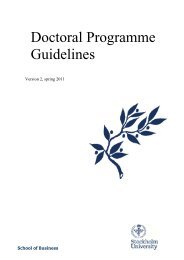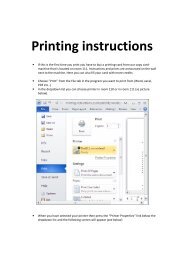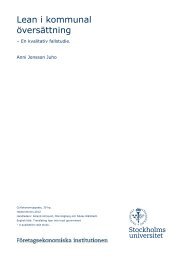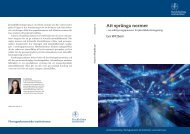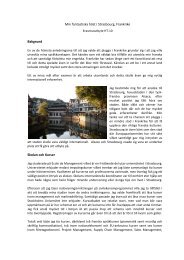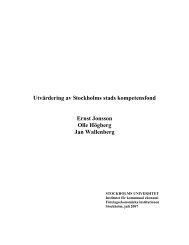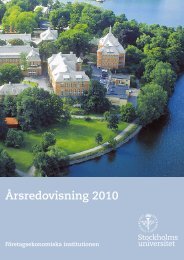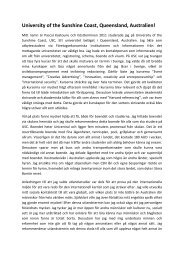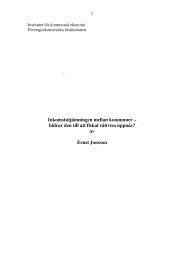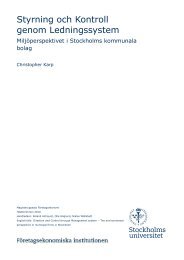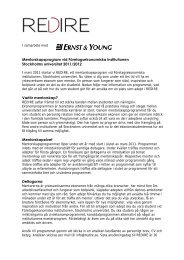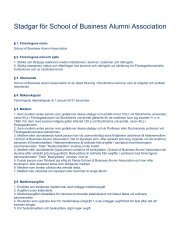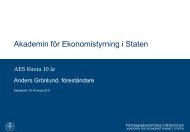Download full programme and abstract book pdf 1.6
Download full programme and abstract book pdf 1.6
Download full programme and abstract book pdf 1.6
You also want an ePaper? Increase the reach of your titles
YUMPU automatically turns print PDFs into web optimized ePapers that Google loves.
06:08<br />
Icel<strong>and</strong>ic auditors skating on a thin ice<br />
Karlsson, Bjarni Frimann<br />
University of Icel<strong>and</strong>, School of Business, Reykjavik, Icel<strong>and</strong><br />
The paper will give a brief overview of the auditing market<br />
in Icel<strong>and</strong> before <strong>and</strong> after the collapse of all the major banks<br />
in October 2008 <strong>and</strong> the financial crisis that followed. In<br />
Icel<strong>and</strong> there are 370 persons who hold a state authorization<br />
as auditors (CPA), whereof only 230 are occupied in the audit<br />
business. Last two decades have shown a strong trend towards<br />
oligopoly in auditing. Of those 230 CPAs there are nearly 60%<br />
working in the BigThree audit firms, who earn almost 70%<br />
of the turnover in this business. The paper will discuss the<br />
consequences of this trend - possible threats <strong>and</strong> opportunities<br />
– <strong>and</strong> in this context the controversial audit rotation rule.<br />
After the banks’ collapse in October 2008 Althingi established<br />
a special investigation commission (SIC) to investigate <strong>and</strong><br />
analyze the processes leading to the collapse of the three main<br />
banks in Icel<strong>and</strong>. SIC delivered its report in April 2010. One<br />
of its conclusions were that the auditors did not perform their<br />
duties adequately when auditing the financial statements of the<br />
banks for 2007 <strong>and</strong> their semiannual statements for 2008.<br />
The paper will take this assertion further <strong>and</strong> look at the<br />
auditing of the financial statements of the biggest 60 companies<br />
in Icel<strong>and</strong> for the period 2004-08, i.e. until the financial<br />
breakdown. All these companies were audited by the BigThree.<br />
It is remarkable that of these roughly 300 financial statements<br />
there are only two with qualified auditor’s opinion. This seems<br />
very strange with respect to that already in the 4Q of 2006<br />
there were clear indications of problems in financing these<br />
companies. Another astonishing finding of the research is that<br />
some certain auditors signed the auditor’s report for several of<br />
these companies at the same time. This raises a question about<br />
those auditors’ independence. In addition to all this there are<br />
examples of a close relationship between auditors <strong>and</strong> CEOs<br />
of certain companies. It is clear that today the audit profession<br />
in Icel<strong>and</strong> as a whole suffers from these flaws. The paper will<br />
conclude with a discussion of what can be done to secure<br />
the independence of auditors. The legalization of audit firm<br />
rotation is proposed as an effective solution of this problem.<br />
06:09<br />
Intangible performance in a theater: Directing the audience of<br />
reports<br />
Sundström, Andreas<br />
Stockholm University School of Business, Stockholm, Sweden<br />
In an organization where performance is perceived to be<br />
difficult to measure, the paper studies how the performance<br />
information producer relates to the measurement dilemma in<br />
reporting by numbers to information users at different levels of<br />
distance. The paper is a case study of measurement practices,<br />
from the perspective of the information producer, focusing on<br />
the top management level in a publicly funded theater. The<br />
qualitative research design incorporated interviews, participant<br />
observations <strong>and</strong> document analysis. The analysis draws<br />
mainly from literature in measurement <strong>and</strong> intangibles. In<br />
the study, an anxious use of numbers in reporting to distant<br />
information users illustrates how the confidence in reporting<br />
numbers regarding intangibles is related to the (dis)trust in<br />
external users’ second-order measurement practices, <strong>and</strong> the<br />
(lack of) control of users’ framing of measurement. The case<br />
reveals efforts made for controlling external users’ framing of<br />
reported numbers, implicating how accountability relations<br />
<strong>and</strong> long-distance control by numbers may work bi-directional.<br />
Key words: Intangibles, Measurement, Use of Information,<br />
Distance, Arts <strong>and</strong> Culture Organizations<br />
80<br />
06:10<br />
Performance measurement - A framing process<br />
Svärdsten, Fredrik<br />
Stockholm University School of Business, Stockholm, Sweden<br />
During the last decades, performance measurement in the<br />
public sector, or public performance measurement (PPM),<br />
has been one of the most researched topics in public sector<br />
accounting literature. Social studies of accounting <strong>and</strong> auditing<br />
have shown that these central technologies of PPM not just<br />
reflect realities; rather they have the ability to create realities. In<br />
this matter the calculative practices of accounting <strong>and</strong> auditing<br />
<strong>and</strong> their ability to shape social reality have been emphasized<br />
in several accounting <strong>and</strong> auditing studies. However, within the<br />
PPM research field the formative role of calculative practices,<br />
i.e. the measurement of public performance, has not gained<br />
much attention. Drawing on Goffman’s (1974) frame analysis<br />
<strong>and</strong> his concept of keying, this paper provides an empirical<br />
account of the use <strong>and</strong> functioning of the calculative practices<br />
of accounting in a Swedish Central Agency. Since 2009 the<br />
agencies in the Swedish Central Government have obtained<br />
new regulations <strong>and</strong> instructions for their annual reports.<br />
Previously the agencies received detailed report requirements<br />
in annual regulation letters. Now the agencies are given the<br />
authority <strong>and</strong> responsibility to decide how to account for their<br />
performance themselves. The empirical evidence has been<br />
obtained through a longitudinal case study of the framing of<br />
performance in the Swedish Energy Agency. What is of interest<br />
in this paper is what the rim of the frame consists of, i.e. which<br />
conditions need to be fulfilled for everyday activity to be<br />
transformed into performance by the calculative practices of<br />
accounting? How is the line drawn between everyday activity<br />
<strong>and</strong> performance? Thus, by empirical evidence, the aim of this<br />
paper is to extend our knowledge of PPM by emphasizing the<br />
constructive role of the calculative practices involved in the<br />
PPM process. The present study shows that the calculative<br />
practices of PPM are not merely technical aspects surrounded<br />
by social processes; rather that they are social processes in<br />
themselves <strong>and</strong> that calculative practices influence social reality<br />
through their specific qualities. When the calculative practices<br />
of PPM transform everyday activity in public organizations<br />
into performance, their associated framing of performance give<br />
rise to both limitations <strong>and</strong> possibilities in PPM <strong>and</strong> affects<br />
how we perceive public performance.<br />
06:11<br />
Reporting methods in management accounting field research<br />
Kihn, Lili-Anne; Ihantola, Eeva-Mari<br />
University of Tampere, School of Management, Tampere,<br />
Finl<strong>and</strong><br />
One of the most notable developments in management<br />
accounting research has been the growing use of various forms<br />
of field research methods, such as single <strong>and</strong> multiple case<br />
studies <strong>and</strong> cross-sectional field studies. As research problems,<br />
theory <strong>and</strong> data have been designed <strong>and</strong> brought together in<br />
new ways, the studies have provided novel ways of thinking<br />
about problems <strong>and</strong> solutions. In doing so, field research has<br />
not only become an important tool of accounting research, but<br />
may have helped practitioners to become aware of, <strong>and</strong> resolve,<br />
their problems. The question as to how to report the use of<br />
qualitative research methods has, however, been identified as<br />
a problematic issue; yet, relatively few academic studies have<br />
examined the issue in management accounting research.<br />
The objective of this study was to explore the ways in which<br />
field research methods are reported in qualitative case <strong>and</strong> field<br />
studies. Systematic analysis of this question sheds light on how<br />
management accounting researchers convince readers about the<br />
scientific nature <strong>and</strong> trustworthiness of research. The results


